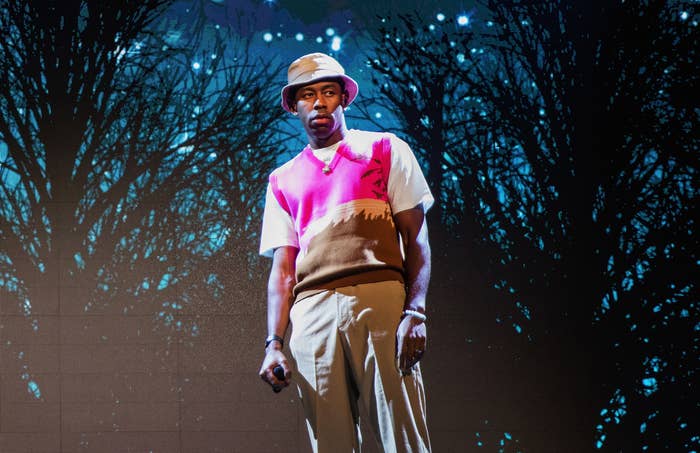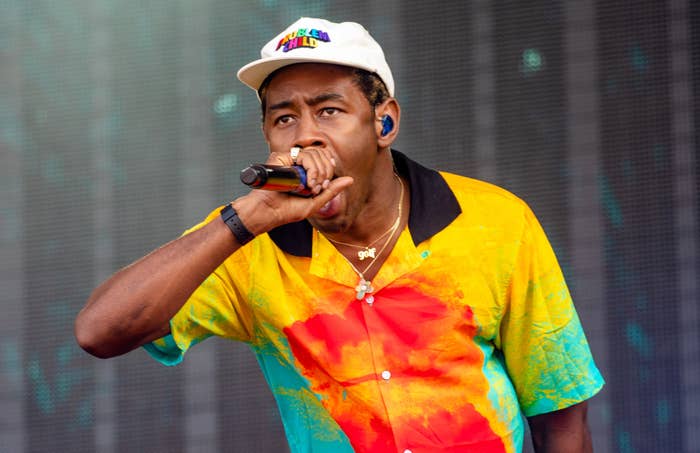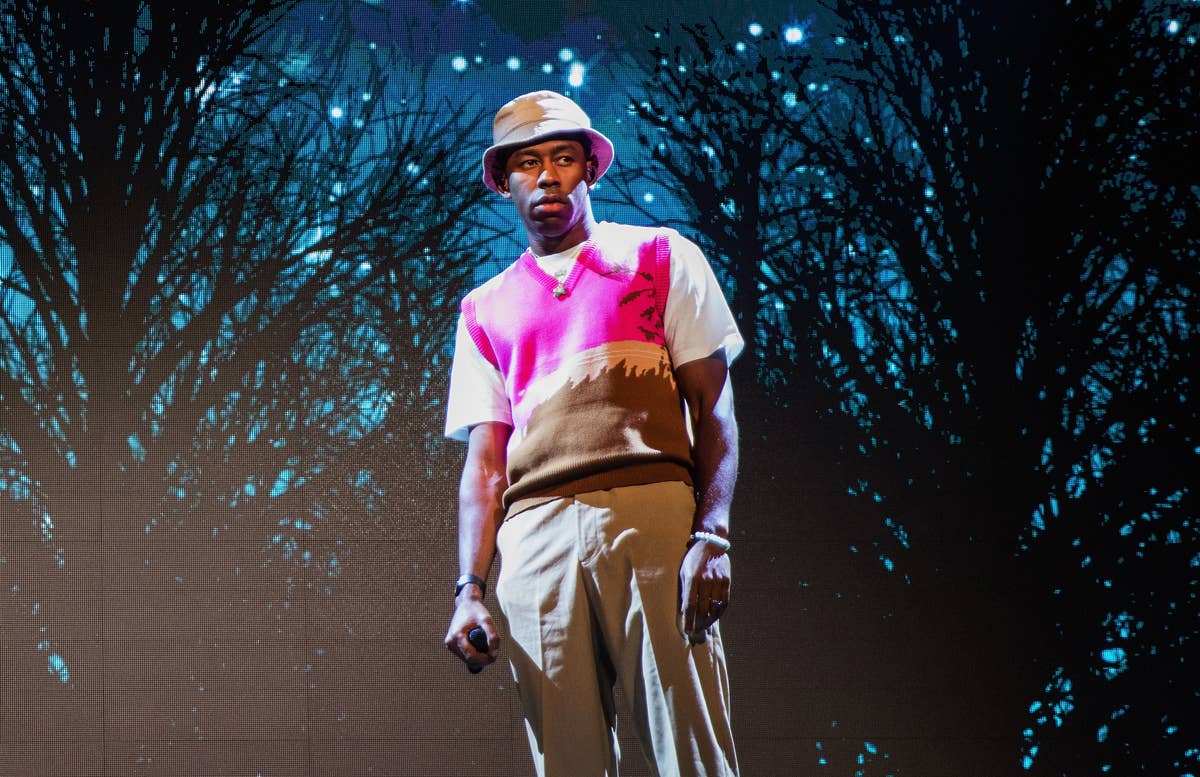
In previous seasons of Spotify's popular podcast, Dissect, host Cole Cuchna has put a microscope over iconic albums from Kendrick Lamar, Kanye West, Frank Ocean, and Lauryn Hill. Each episode, he uses in-depth lyrical and musical analysis to uncover what makes these albums so special.
So, what's next? Season 4, which premieres April 16 on Spotify, will revolve around Tyler, the Creator's Flower Boy.
Revealing the news to Complex, Cuchna says the album's composition gave him a chance to explore music theory more deeply than he has on any other season of Dissect. He explains, “A lot of these songs are so catchy, it’s easy to overlook the uniqueness of what he’s doing. We don’t very often get this trifecta of harmonic complexity, catchy singable melodies, and deep introspection, all wrapped into a single, extremely cohesive album.”
Cuchna says he hopes the season brings more attention to Tyler’s well-rounded musical gifts. “Perhaps more than a lyricist, I think appreciating him as an artist and storyteller might be most fitting,” he notes. “Tyler is doing it all. I’m not sure how many people know that, and if they do, I’m not sure they fully know the level he’s composing at now. His chord changes alone are among the most interesting I’ve unpacked, regardless of genre, and the way he’s using synthesizers and keyboards like orchestral instruments is really, really cool.”
The season's 13 episodes will air every Tuesday, before the finale arrives on the second anniversary of the album's release. You can find the show on Spotify here. Complex spoke with Cuchna about what fans can expect from the new season. The interview, lightly edited for clarity, is below.

Why did you want to dissect Flower Boy this season? What about the album lends itself well to a podcast like Dissect?
First, and perhaps most importantly, it’s a beautiful album. I was initially drawn to its production, which Tyler does himself. More specifically, it was the chord progressions and his jazz-inspired harmonies that caught my ear, and later it was the way he uses his instruments orchestrally. Once I got beyond that, I realized Flower Boy was a concept album that contains a very clear, well-executed narrative and a number of thought-out symbols and themes.
Once I figured out how powerful the narrative was—that it was this journey to self-discovery and confronting the parts of yourself you typically avoid confronting—I just thought it was a powerful message and one that we all need to hear and understand. Essentially, the more and more I dug, the more and more I found, which is what you need for a podcast like Dissect. You need layers, and this album’s full of them.
You've spoken highly about the album since it released, and you considered it for past seasons. Why is now the right time?
I enjoy focusing on music of our era because it’s important that we celebrate the great works and artists of our time. But I also want to give an album some breathing room. It needs to marinate past the initial release buzz and infiltrate the culture a while. Two years seemed like a good amount of time.
Also, I think Tyler’s personal story, which is encompassed in this album, is one that we need to hear right now. In episode one, we take it back to the beginning of Tyler’s career and revisit the more controversial lyrics of his early albums. However you might feel about those lyrics, Tyler has clearly matured past them now some 8 years later, and I think observing that maturation is important. In a cultural climate that’s quick to cancel with one false step, I think Tyler’s story is one worth remembering. We aren’t always who we were yesterday, and certainly most of us aren’t who we were at age 17.
Tyler’s personal story, which is encompassed in this album, is one that we need to hear right now.
Tyler isn't known by certain fans as being as "lyrical" as some artists you've dissected in the past, like Kendrick Lamar. Do you think fans will gain a new appreciation for him as a rapper after hearing this season?
I hope more appreciation is garnered, definitely. Perhaps more than a lyricist, I think appreciating him as an artist and storyteller might be most fitting. And really, it’s hard for me to even compare Tyler to rappers because he’s so much more. It’s like calling Pharrell a rapper. It doesn’t quite encompass everything he’s doing, which is quite literally everything: production, composition, instrumentation, song structure, melodies, and lyrics. Tyler is doing it all. I’m not sure how many people know that, and if they do, I’m not sure they fully know the level he’s composing at now. His chord changes alone are among the most interesting I’ve unpacked, regardless of genre, and the way he’s using synthesizers and keyboards like orchestral instruments is really, really cool.
What is the one interesting thing you've learned about Tyler since diving in so deeply into his work?
We typically think about “singer-songwriters” existing in folk and pop traditions, but Tyler to me is a hip-hop singer-songwriter. Like I said, he’s writing and performing his rhymes as well as handling the production. And he very rarely samples, which means he’s writing chord progressions just like a traditional singer-songwriter would. I didn’t realize the level he was doing all these things until I really dug deep into the album.
Is there anything else you'd like our readers to know about this new season?
It’s definitely the season with the most music theory. With exception of the first two episodes, most episodes are divided pretty equally between musical and lyrical analysis. I really wanted to showcase how Tyler is able to incorporate all these interesting and diverse musical elements, and really unpack what he’s doing at a musical level. Because a lot of these songs are so catchy, it’s easy to overlook the uniqueness of what he’s doing. We don’t very often get this trifecta of harmonic complexity, catchy singable melodies, and deep introspection all wrapped into a single, extremely cohesive album. I hope to shine a light on just how special I believe this album is—one that I’m putting right alongside To Pimp a Butterfly (Season 1), My Beautiful Dark Twisted Fantasy (Season 2), Blonde (Season 3) and Miseducation (Miniseries 1).

